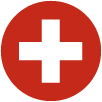share

Julda, Ambilobe, Madagascar, November 2024. SInce the passage of cyclone Gamane, Julda has been promoting cooperation to keep herself and her community safe from cyclones. | © A. Perrin / HI
Julda tells us about her life in Madagascar, an island particularly prone to cyclones. Paralysed in both legs, she talks about what it is like for people with disabilities when a disasters hits.
My name is Julda, I'm 36 and I live in Ambilobe, in the north of Madagascar, with my parents and my 5-year-old son. My life changed dramatically when I was seven. I was confined to bed with a high fever; the doctors didn’t know what was wrong with me. Shortly afterwards, my legs stopped functioning and developing and I've been in a wheelchair ever since.
Before Cyclone Gamane hit in March 2024, I used a sewing machine to make clothes and other objects. It was my way of supporting myself and gaining a bit of autonomy, but the cyclone turned my life upside down.
I’ll never forget that night. The water began to rise in our house while my son and I were asleep; it must have been around 8pm. Everything happened so quickly: the panic, the urgency, the uncertainty. I couldn't move around on my own, so evacuating was very complicated for me. Fortunately, my neighbours were fantastic and helped us to get to safety. They pushed my wheelchair to the nearest shelter. My son and I stayed there for seven days.
These memories have stayed with me... The hurricane season has started and I know there's a risk of it happening again – and that scares me. My house, like that of so many others in our community, is still in a poor state. Also, since Gamane hit, I no longer have my sewing machine - it was swept away with some of our belongings during the floods. I sell snacks after school so that I’m not totally dependent on my parents with whom I live, but my resources are even more limited than before...
After the cyclone, my family and I moved to another fokontany1 in Ambilobe. Shortly after we settled in, I joined an Organisation of People with Disabilities (OPD) supported by HI, which has helped me feel a lot more hopeful. This OPD gives members the opportunity to discuss their day-to-day problems, share solutions and work together to improve inclusion locally. When I joined it, I met other people in situations similar to mine. I've also taken training courses to learn more about my rights and how to assert them. These workshops and meetings have helped me to see my disability in a different light, to gain self-confidence and flourish.
HI has also provided me with a new wheelchair. My last wheelchair was old and difficult to manoeuvre. This new one has given me new freedom. I can move around more easily, which makes my day-to-day life a lot easier.
Today, I want to pass on what I've learned. When I meet a person with a disability, I encourage them to join the organisation because it helps us to get organised and make our voices heard in the community.
I also think that the authorities need to do a better job of informing vulnerable communities, particularly those living near rivers. Warnings often come too late, and in many communities, evacuation infrastructures are not adapted for people with disabilities or specific needs. This makes evacuations even more difficult and dangerous.
It is essential that cyclone risk management solutions take into account everyone's specific needs. This means providing accessible evacuation zones, clear and rapid information, and genuine consideration of the needs of the most vulnerable. By working together at a local level, we can better prepare the community for hurricanes and guarantee everyone's safety.
1. Traditional Malagasy village or administrative subdivision, which may include hamlets, villages, sectors or neighbourhoods.








HI is an independent and impartial aid organisation working in situations of poverty and exclusion, conflict and disaster. We work alongside people with disabilities and vulnerable populations, taking action and bearing witness in order to respond to their essential needs, improve their living conditions and promote respect for their dignity and fundamental rights.
HI is an independent and impartial aid organisation working in situations of poverty and exclusion, conflict and disaster. We work alongside people with disabilities and vulnerable populations, taking action and bearing witness in order to respond to their essential needs, improve their living conditions and promote respect for their dignity and fundamental rights.







